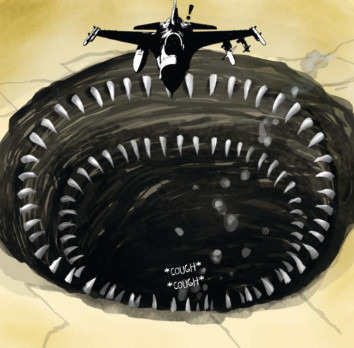
If the American administration is to have any hope of beating Daesh (Islamic State of Iraq and the Levant), US President Barack Obama must adopt a much more robust and multifaceted strategy than the one being followed presently. No more dithering, no more going for a long-term military campaign, which could take as long as three years or more, as he and the others have been warning. The campaign should not be about bringing more countries on board to fight the war, there are around 65 already, but should now focus on hard-hitting, gruelling and meaningful actions. It should not just rely on force, but use more diversified political factors to draw the campaign forward. Obama has already admitted the intelligence failure to spot the unexpected rise of Daesh, which unleashed its men, fire-power, tanks, mortars and a lot of money through controlling oil installations and refineries. They managed to wrest power because of the chaotic and deteriorating situation and dwindling state institutions and armies, both in Iraq and Syria.
The Obama administration has to buckle down and retake the initiative while employing the “degrade-and-ultimately-destroy” concept to eliminate the threat of Daesh, which established its so-called Islamic Caliphate in Iraq in late-June 2014 and expanded it to Syria with its capital in Riqqa on an area the size of Jordan and/or Belgium. America must be aware of the formidability of the terror organisation, joined by many others like Al Qaida’s Jabhat Al Nusra front. Obama needs to recognise their toughness and eagerness to fight and consolidate rather than retrench.
The blows on Daesh in Syria, starting on September 23, a continuation of strikes on their strongholds in Iraq since August 8, did not dampen its appetite as it was originally thought. Instead, it increased their determination in Kobani on the Syria-Turkish border for instance, where battles went on for weeks and are likely to continue with Daesh almost certain to succeed if there is no immediate turnaround. The terror balance there was 50-50 for the last two weeks, with the latest figures showing the number of deaths at 200 for each, despite the local resistance having much less-sophisticated weaponry than those of Daesh. In Iraq, it has been the same story with Daesh gaining new grounds in towns, cities and villages from Fallujah to oil-rich Mosul in the north east to Iran. In Al Nabar, Daesh added Kubaisa and hit below the belt, housing a military base nearby and taking Ameriyat, about 16km from Baghdad.
All this increased criticism of the Obama administration, especially since US and the rest of the coalition planes were flying above the area. Calls are now being made loud and clear for Obama to put his act together, re-evaluate his military strategy based on air strikes and adopt a more flexible approach to beat Daesh in a war that has already cost at least $1.5 billion (Dh5.51 billion), but with little tangible results. Democrats and Republicans are scathing. Top politicians, former defense secretaries Leon Panetta and Robert Gates, former US presidents Jimmy Carter and Bill Clinton and Republicans John McCain and Lindsey Graham are pleading with Obama to change course. They want him to put “boots on the ground” to match the missiles from the sky to be effective and open other fronts and shake hands with opposing allies.
A wider strategy in the short term can have more sting. However, what is needed is a change in the mindset. Obama is on record, saying his priority is to fight Daesh and not the regime in Syria, and he fears going for ground troops might push American soldiers into a new quagmire. This is not to say anything about the issue of international legality and sovereignty of the situation. Of course that stance has angered politicians like McCain who say Daesh and the Syrian regime must be fought at the same time because they feed on each other and the hope of creating a professional cadre — talk of training 5,000 personnel over the next three years in Saudi Arabia, one of the five Arab coalition members — will fail. The fear is they may go back to the opposition that is against the coalition and/or be targeted by the regime. This is the position Turkey has also taken. It wants to see the US-led coalition attack both — the Syrian regime, by enforcing a no-fly zone over its territory, and Daesh other extreme organisations.
Turkey’s position has been complicated by the fact Kobani is a Kurdish town. It is reluctant to help its population because the Turkish government says they are linked with the KPP, the Kurdish rebel group that it is negotiating with. However, Turkey is continually mulling its position. But as many suggest, the US and Obama can still play the devil’s advocate, go all the way and bring in, however tactically, Syria and Iran, into the coalition. After all, it is Syrian territory and air space that is being used to bomb Daesh positions.
The argument goes that the Syrian army can be used because they have been fighting Daesh and the other opposition groups for the last three years. They know exactly where the Daesh positions are in posts and areas of concentration in the northern part of the country.
The question is not farfetched as it seems. After all, those in the US who talk of the need for a multi-faceted approach say there needs to be some kind of guidance on the ground of where to direct the planes and the strikes and these would be needed in the aftermath to see their effectiveness. For such liaison purpose, there need not be hard-core personnel from the Syrian army.
The argument also calls for Iran, which has been itching its fingers to join the international coalition. It knows the area and the terrain by virtue of its long-standing conflict with Iraq in the 1980s. Now, and regardless of whether one likes it or not, Iran has significant influence on Iraqi politics because of the Shiite elements and also because it is a close friend of the Syrian regime. It is about politics in the end and how much Obama is willing to walk the tight rope of expediency. In all honesty, the Americans do not see the Baathist regime as much of a threat to the West as do Daesh whose ideology and being are in complete contradiction with it.
Only time will tell what is going to happen. What is for certain, though, is that the Obama administration will continue to feel the heat if it does not turn things around quickly.
Marwan Asmar is a commentator based in Amman. He has long worked in journalism and has a Phd in Political Science from Leeds University in the United Kingdom.







